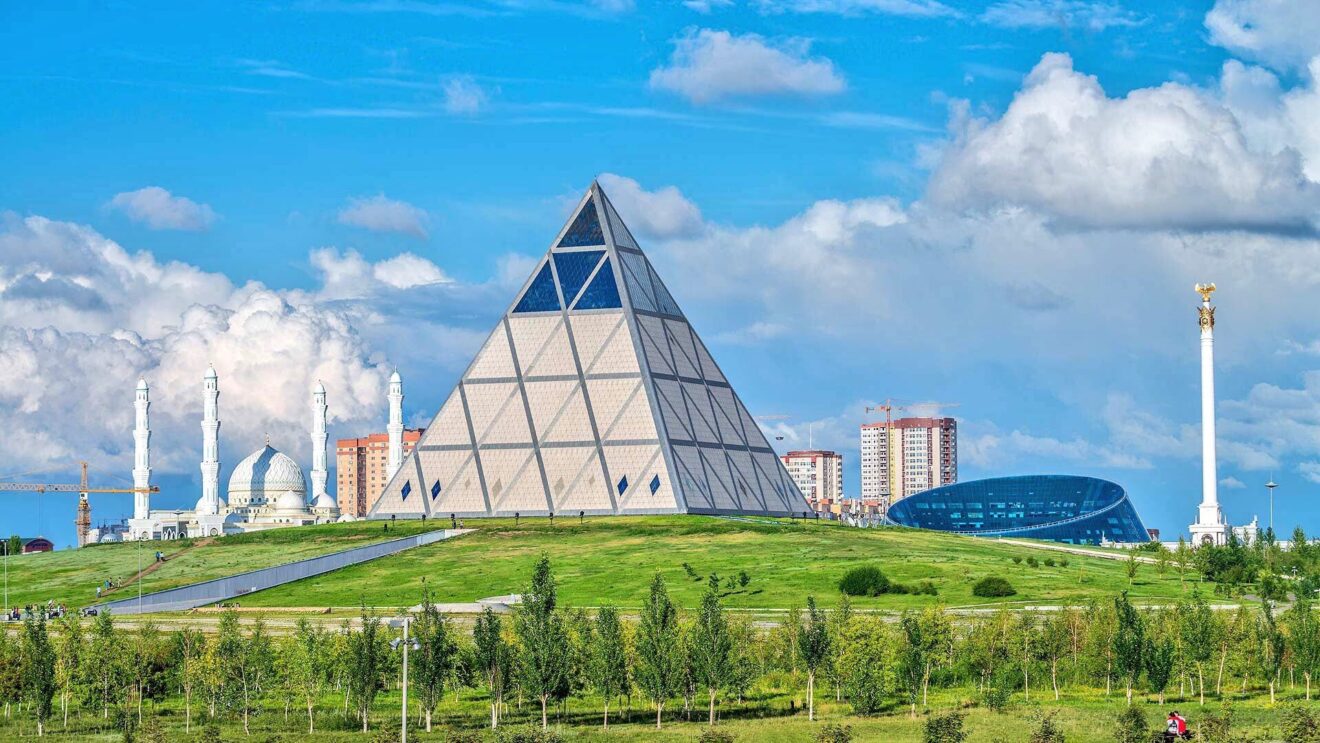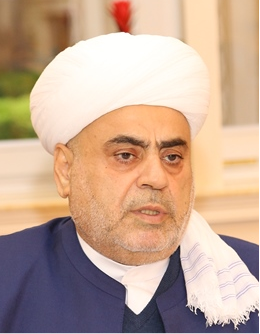The world, when humanity has already crossed the threshold of the third millennium, is shaken by various challenges and threats that undermine the very basis of our existence such as military clashes, extremism, terrorism, xenophobia in its inter-ethnic and interreligious manifestations, global climate change, and epidemics that humanity has never faced before. It does not require proof that the modern world’s problems are rooted in a profound spiritual crisis caused by a departure from traditional moral principles and values.

The building of the Palace of Peace and Reconciliation in Astana. Photo credit: explorekazakhstan.com.
The modern world is experiencing a global clash between the destructive tendencies of denying centuries-old foundations of human society and traditional moral and spiritual values. In this opposition, the Faith is the main defender of spirituality since all world and traditional religions are united in calling for peace, harmony and creation and, most importantly, respecting the universal values of family, human fraternity and coexistence.

Sheikh-ul-Islam Allahshukur Pashazade.
The initiative put forward by the leadership of Kazakhstan some 20 years ago to promote dialogue between world and traditional religions has opened new opportunities for productive cooperation between states, the public and religious leaders from different countries. The fact that this platform continues to be important demonstrates the urgency and productivity of this idea.
It is possible to state with confidence that the invaluable contribution to this is due to President of Kazakhstan Kassym-Jomart Tokayev, his long-standing consistent efforts, ensuring continuity and further development of the idea of interreligious dialogue and cooperation within the framework of the Astana’s Congress of the Leaders of World and Traditional Religions. It was he who, for many years, directly led the Secretariat of the Congress and developed the concept of the Astana format of interreligious dialogue. It is he who continues to patronize this internationally recognized platform today.
Signed in 2019 by the leaders of the Christian and Muslim world – His Holiness Pope Francis and Grand Imam Al-Azhar Sheikh Ahmed Al-Tayyeb, a document on Human Fraternity for World Peace and Living Together was a manifesto not only for Christians and Muslims but also for all people of the Faith, all those who advocate human solidarity and peaceful coexistence among people of different faiths and beliefs.
It is no coincidence that this document, whose historical significance cannot be overestimated, is in line with the ideas and resolutions adopted within the framework of the Astana Congress of the Leaders of World and Traditional Religions, including the seventh Congress of the Leaders of World and Traditional Religions. It was attended by distinguished public and political personalities, together with eminent representatives of world religions, and included more than 100 delegations from 50 countries.
As the practice of recent decades has shown, more than the efforts of leading politicians and state leaders are needed to prevent contemporary threats and challenges successfully. Emphasizing the traditionally special role of religion in achieving peace and security, understanding and solidarity among human beings in a changing world, we are aware that real and effective results in this area cannot be achieved without productive cooperation between the state and religion and the efforts of politicians and religious leaders.
It is one of the most important advantages of the initiative put forward two decades ago by Kazakhstan to establish the Astana Platform for Dialogue among Religions and Civilizations, which brings together representatives of world and traditional religions, statesmen and public figures for peace and security in the world. This idea comes naturally from the way of life of Kazakh society, where people of different nationalities and faiths have lived in peace and harmony for centuries.
Along with their common ethnic roots, language, history, religion, and culture, the fraternal states of Azerbaijan and Kazakhstan share the historical traditions of inter-ethnic and interreligious tolerance. Our countries are at the crossroads of world civilizations. Preserving our people’s religious and cultural diversity is an important policy of our state.
All conditions have been created in Kazakhstan and Azerbaijan to ensure civil harmony, development of multiculturalism, interreligious peace and cooperation, and relations between religion and the state have been carefully and successfully built.
I am very pleased that the brotherly relations between the Presidents of Azerbaijan and Kazakhstan – Ilham Heydar oglu Aliyev and Kassym-Jomart Tokayev – contribute to the comprehensive development of relations between our countries and peoples. During the meeting of our heads of state in Astana in April, the President of Kazakhstan emphasized the strong ties of centuries-old friendship and mutual support between the two peoples and highly valued the strategic partnership between Azerbaijan and Kazakhstan in the established by a solid legal framework, as well as close cooperation between the two countries within the framework of various international platforms.
In particular, I emphasize the importance of deepening cultural, religious and spiritual ties between our fraternal peoples and states, including in preserving and developing common traditional moral and spiritual values and Turkic-Islamic heritage.
The joint activities carried out by the Caucasus Muslim Board and the Administration of Muslims of Kazakhstan in Astana and Baku, Turkistan and the cultural capital of Azerbaijan, Shusha, are clear indicators of successful cooperation in these areas. The establishment in 2022 in Shusha of the Council of Heads of Muslim Religious Directorates of the Organization of Turkic States is a proof of our shared ideas and goals.
As a member of the Secretariat of the Congress of the Leaders of World and Traditional Religions, I would like to express my deep gratitude to the leadership of fraternal Kazakhstan, personally, President Tokayev, for creating, supporting and ensuring the further development of one of the most important international formats of global interreligious dialogue – the Astana Congress of the Leaders of World and Traditional Religions.
The author is Sheikh-ul-Islam Allahshukur Pashazade, the Chairman of the Caucasus Muslim Board, a member of the International Council of Muslim Elders, and a member of the Secretariat of the Congress of the Leaders World and Traditional Religions.
